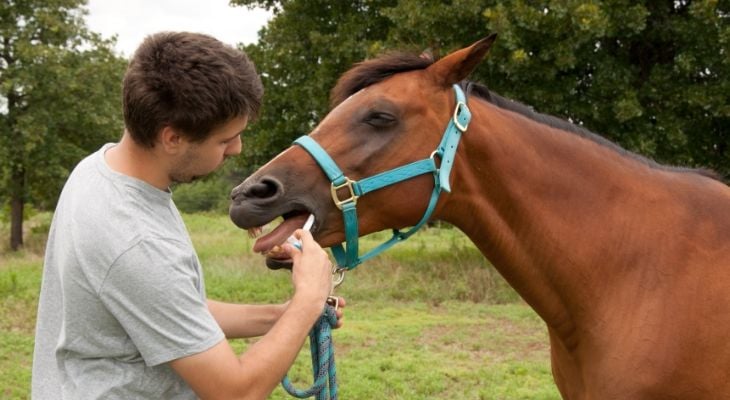Deworming and Internal Parasites
- Created in Equine, Pet Health, Pests and Parasites

Like any animal, horses are susceptible to a wide range of parasites. Of the approximately 150 species of internal equine parasites, some can cause serious harm while others are more of an annoyance.
Usually parasite eggs or larvae arrive on the ground from the manure of infected horses. Another horse ingests the parasite while grazing. Then, the egg or larva matures into adulthood in your horse’s intestinal system. From there, they may migrate into other organs, causing various problems.
Here are some of the most common types of internal parasites that can affect your horse’s health and happiness.
Large Strongyles
Also known as bloodworms, the larvae of this parasite migrate through your horse’s abdominal arteries. This can block circulation or cause rupture, thus damaging the liver or other organs. Symptoms include anemia, weight loss and colic. To prevent this potentially fatal parasite, you must frequently deworm your horse.
Small Strongyles
Larvae of this parasite, scientifically known as cyathostomes, burrow into colon walls. They may remain encysted for months or years, and then suddenly emerge, causing diarrhea, muscle wasting, weight loss, colic and other severe health problems.
Ascarids
Usually, ascarid infestation, also known as roundworms, results from horses ingesting contaminated water or hay. Eggs hatch in the stomach. The larvae migrate to heart, liver and lungs. The horse coughs up the larvae, and then swallows them. Back in the stomach, the larvae mature into adults. Roundworms can cause many problems, including pneumonia, colic, diarrhea, liver damage, intestinal blockage or rupture. Horses younger than 2 years old are especially susceptible to roundworms.
Tapeworms
Horses can ingest mites containing tapeworm eggs while grazing in pastures. Once inside the horse, eggs mature into adult tapeworms within six to 10 weeks. Adult tapeworms attach to the horse’s intestinal lining, absorbing nutrients. Symptoms of tapeworm infestation include rough hair coat, colic and other signs of nutritional deficiencies.
Botflies
Botflies lay eggs on the front legs of horses, on their shoulders, on their lips and around their jaws. When the horse licks itself, it swallows the eggs. These eggs attach to the horse’s stomach walls, where they mature into grubs. They can live inside a horse for up to a year before passing out through feces. Botflies develop into adults while in soil. Horses seldom develop serious problems from botflies, but excessive concentrations may be associated with gastric ulcers.
Eye Worms
If your horse’s eyes are tearing excessively, it may have eye worms. These parasites, which live in tear ducts, can also cause conjunctivitis or light sensitivity.
Stomach worms
Flies transmit stomach worm larvae. Horses lick off the larvae and swallow them. Usually, stomach worms only cause mild diarrhea. However, if the larvae enter open sores on your horse’s skin, a serious condition called “swamp cancer” or “summer sores” may ensue. An itchy granuloma, or raised sore, can severely traumatize that area of skin.
Threadworms
Foals often get this parasite through mare’s milk or from bedding. Larvae enter the small intestines and lungs, causing diarrhea. Foals typically become immune to threadworms once they pass the age of 3 months.
Filarids
Biting flies transmit these skinny worms, which inhabit the neck ligaments and skin of horses. This condition makes your horse very itchy. Larvae can also get in horses’ eyes.
Lungworms
If a horse is pastured with mules or donkeys, it may pick up lungworms. Larvae migrate into horses’ lungs, where they mature and lay eggs. Symptoms include coughing and breathing troubles, especially during exercise.
Pinworms
Since pinworms lay eggs around the horse’s anus, the first sign of pinworm infestation is usually an itchy rear end. If your horse is rubbing off the hair around its tail, pinworms may be the problem. Horses usually develop immunity to pinworms as they mature. If your horse has pinworms, use disposable wipes to clean under its tail. Never use reusable rags or sponges, which may spread the infection.
Equine Protozoal Myeloencephalitis (EPM)
A protozoal parasite, Sarcocystis neurona, causes this serious disease. Opossums spread EPM through their feces. Horses come into contact with the infected organism through contaminated water or feed, or by grazing. The parasite attacks the central nervous system and can lead to permanent neurological damage.
All horse owners need to be aware of parasites that can affect their horses. Consult with your equine veterinarian about how frequently you should use deworming medications. A broad-spectrum deworming medication can control many of these parasites. Call our office today, so we can keep your horse healthy, comfortable and parasite-free.


